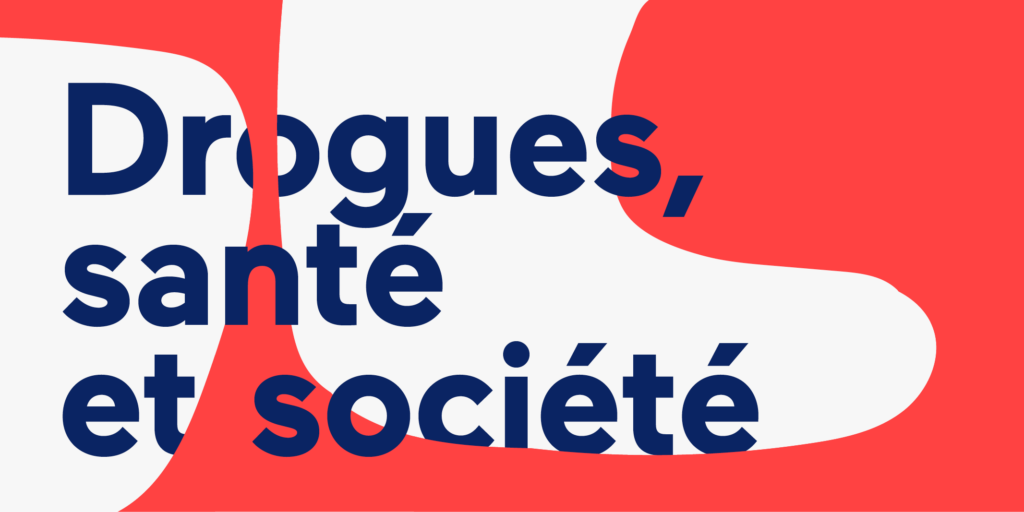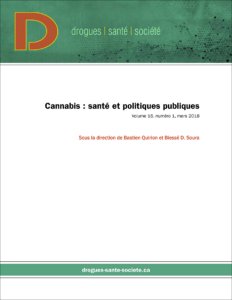
For this fifth interview in the “5 questions with…” series, Érudit spoke with Jean-Sébastien Fallu, editor-in-chief and director of the journal Drogues, santé et société, on the occasion of the journal’s 20th anniversary.
A multidisciplinary scientific journal, Drogues, santé et société is “dedicated to the publication of original research findings and feature articles, as well as to the transfer of knowledge, about the use and abuse of drugs (alcohol, tobacco, medication, illicit drugs) and related phenomena.” Current issues and archives of the journal are freely available on the erudit.org platform.
1. Drogues, santé et société is celebrating its 20-year anniversary this year, could you tell us in what context the journal was founded and how it has evolved?
Here is the original context. Psychotropes : Une revue internationale des toxicomanies was founded in 1995 and it was led by a committee of both France- and Québec-based members. Differences in perspective arose over the years between the editorial boards of each country, notably around the choice of articles to publish and the related evaluation process, which led the Québec committee to the decision in 2001 of breaking ties with Psychotropes and to create a journal in Québec. A project was proposed, with an entirely Québec-based editorial board and support from an international scientific committee. Additionally, the then-recent creation of Érudit allowed the journal to be more widely disseminated electronically. That is how Drogues, santé et société (DSS) was born, a French-language journal with international and multidisciplinary aims, in both print and electronic formats, with a rigorous evaluation process. It focused on the phenomena of drugs in general, which includes gambling, screen use and other related phenomena.
The first issue explored the theme of “Family and Addictions” (Famille et toxicomanie) guest edited by Louise Guyon and Marie-Andrée Bertrand. The launching of the journal happened at the Forum mondial drogues et dépendances in 2002, and the journal has been available for free since then. Creating the journal was made possible primarily through funding from the Ministère de la Santé et des Services sociaux, on top of subscription fees and financial support from the Université de Sherbrooke, the Fédération des centres de réadaptation en dépendance du Québec, the Fonds de recherche du Québec – Société et culture and the Centre Dollard-Cormier. What’s more, the objective of DSS has always been to popularize science for practicians and students.
DSS decided to use its 20th anniversary to give its image and its website a complete makeover. New sections were also added to the issues, notably editorials. In the future, DSS wants to add even more sections, such as commentary, debates, and book reviews. The future of DSS is closely tied to public funding. It bodes well that there is greater discourse on how essential French-language publishing is, and also seeing a greater number of events related to the importance of French in the sciences and in higher education.
2. Drogues, santé et société describes itself as a multi-disciplinarian journal, publishing articles written from a diversity of perspectives. Could you tell us more about this choice?
The question of drugs in society is fundamentally multi-disciplinarian, and research on the subject naturally draws from different pragmatic and methodological traditions, such as medicine, psychology, sociology, social work, anthropology, public health, criminology, economics, politics and history. We posit that in order to fully explore the issue, research must make use of all of these levels of analysis (and others) as well as several different epistemological frameworks. That is what makes DSS and the articles it publishes so rich.
3. The journal publishes articles that cover the use of drugs and other psychoactive substances, the phenomenon of gambling, and other related realities. What are the current issues in these areas that are of particular interest to researchers and the journal?
The current issues have multiplied in recent years as the field of research has been undergoing a massive transformation on many levels. The evolution of the social representations of drugs, of their regulation models, of concepts, of therapeutic approaches, of the substances used, of routes of administration, and more, makes this a rapidly evolving theme.
The overdose crisis, the security concerns around substance smuggling, the legalization of cannabis, the decriminalization of drugs, the psychedelic renaissance are all phenomena that contribute significantly to a transformation in the research around drugs, especially as we are seeing the introduction of ideas like pleasure, normalization, stigmatization and the inclusion of people who use substances, not only in studies and research projects, but in society in general. Psychoactive drugs as technologies that fit into transhumanism are also an increasingly contemporary critical perspective.
Drugs are a multifaceted question, which encourages researchers to adopt an increasingly complex and nuanced perspective, which takes into account epistemic inequities and stigmatization as a social determinant of health, using both as primary dimensions to addiction research. While there have been an increase in the social inclusion of people who use drugs, stigmatization and negative, distorted views of people who do remains spectacularly common, especially for people from lower socioeconomic backgrounds. All of this is even more relevant when accounting for the current trend toward the medicalization of drug use.
The possible future deregulation of drugs is also a subject of interest, particularly as it relates to the underlying trends of the capitalist and neo-liberal political and economic model, which might give rise to social and health risks.
4. The legalization or decriminalization of drugs is a subject that is frequently being discussed, both in Canada and abroad. How can a scholarly journal contribute to such debates?
As early as 2015, even before legalization had officially become part of the political agenda in Canada, DSS had organized a day of debate on the subject, which led to the publication of a thematic issue. Since then, several articles have specifically covered the various issues around legalization, regulation, and decriminalization of drugs. A journal like DSS can certainly push the debate forward, both locally and internationally.
On top of that, the legalization of cannabis, the overdose crisis, the decriminalization of drugs and the psychedelic renaissance are all phenomena that generate a lot of questions and subsequently, a lot of scientific research. DSS serves as an excellent forum for publishing studies written in French in Québec, Canada and throughout the French-speaking world on the subject.
Finally, with the future inclusion of editorials and other article types (debates, commentary, etc.), DSS can facilitate even further the scientific narrative around these subjects, and many others.
5. Could you present some of the articles published in Drogues, santé et société which have made major impacts over the last twenty years?
Several articles in DSS impacted the disciplines they were covering.
A first article we would mention that had a major impact on the practice was written by Landry and Lecavalier in 2003, where they drew up a summary of the strengths and limitations of the harm-reduction approach in the context of rehabilitation, which supported the development of the practices used in addiction rehabilitation centres.
→ Landry, M. et Lecavalier, M. (2003). L’approche de réduction des méfaits : un facteur de changement dans le champ de la réadaptation en toxicomanie. Drogues, santé et société, 2(1).
A second article that we should mention was written by Jean Langdon in 2005, as it is still relevant almost 20 years later and is still regularly cited. The author is an American anthropologist that remains a renowned scholar in the field of studying the use of psychoactive substances by South American Natives. The text concerns the Native people of Brazil, but it is also relevant for Canadian Natives and deserves to be more widely known, especially in intervention settings.
→ Jean Langdon, E. (2005). L’abus d’alcool chez les peuples indigènes du Brésil : une évaluation comparative. Drogues, santé et société, 4(1), 15-52.
Suissa’s article, written in 2009, also made important practical and scientific contributions to the discourse on the concept of addiction and its extension to behaviours that do not involve substances, a major debate and development in the field of addiction research at that time.
→ Suissa, A. J. (2009). Du concept d’addictus au processus de dépathologisation : la richesse psychosociale du concept de dépendance selon Stanton Peele. Drogues, santé et société, 8(2), 75–108.
Next, there is the article written in 2011 by Thoër and Robitaille which had significant scientific and political reach, describing the habits, discourse and representations of people involved in an emerging phenomenon: the use of medical stimulants for performance reasons in school and work contexts.
→ Thoër, C. et Robitaille, M. (2011). Utiliser des médicaments stimulants pour améliorer sa performance : usages et discours de jeunes adultes québécois. Drogues, santé et société, 10(2), 143–183.
Finally, there was a whole issue on the theme of “Cannabis: Public Health and Policies” (Cannabis : santé et politiques publiques), but there were two particular articles, the one by Beauchesne (2018) on the challenges of cannabis legalization and the one by Jobidon and Jutras-Aswad (2018) on the importance of nuance when establishing the harmfulness of cannabis, which had significant political, social and scientific impacts.
→ Beauchesne, L. (2018). Légaliser le cannabis au Canada : les défis à venir. Drogues, santé et société, 16(1), 31–69.
→ Jobidon, L. et Jutras-Aswad, D. (2018). Le cannabis et ses effets délétères : pour un débat plus nuancé. Drogues, santé et société, 16(1), 5–30.
Curious to learn more about scholarly journals? Read the other interviews in the “5 questions with…” series.

